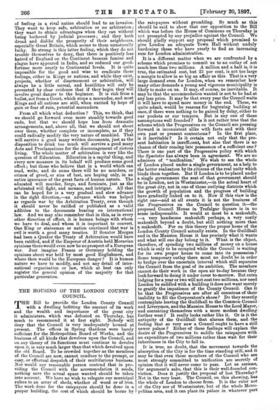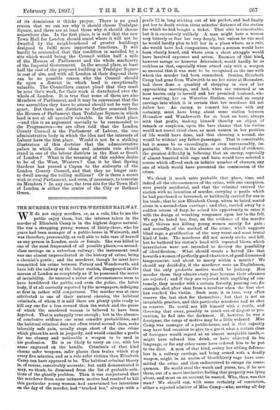THE HOUSING OF THE LONDON COUNTY COUNCIL. T HE Bill to
provide the London County Council with a dwelling befitting the amount of its work and the wealth and importance of the great city it administers, which was defeated on Thursday, has much to recommend it at first sight. Nobody will deny that the Council is very inadequately housed at present. The offices in Spring Gardens were barely sufficient for the Metropolitan Board of Works, and the business of all kinds that devolves upon the Council, and on any theory of its functions must continue to devolve upon it, is very much larger than that which devolved upon the old Board. To be crowded together as the members of the Council are now, cannot conduce to the prompt, or easy, or effectual despatch of their multifarious business. Nor would any reasonable person contend that in pro- viding the Council with the accommodation it needs, nothing save the actual space wanted should be taken into account. We have no wish to relegate our municipal rulers to an array of sheds, whether of wood or of iron. The work done for the ratepayers should be done in a proper building, the cost of which should be borne by the ratepayers without grumbling. So much as this should be said to show that our opposition to the Bill which was before the House of Commons on Thursday is nct prompted by any prejudice against the Council. We should gladly support any proposal which promised to give London an adequate Town Hall without unduly burdening those who have yearly to find an increasing sum for London administration.
It is a different matter when we are confronted by a scheme which promises to commit us to an outlay of not much less than two millions. A million and a halt is, it is true, the estimated cost, but 25 per cent. is not too large a margin to allow in so big an affair as this. That is a very large demand even for London, when we remember how many other demands a young and vigorous municipality is likely to make on us. It may, of course, be inevitable. It may be that the accommodation wanted is not to be had at any less price. It may be that every year the Council waits it will have to spend more money in the end. These, we quite admit, would be reasons for beginning building at once, if there were nothing to be gained by delay, either to our pockets or our tempers. But is any one of these assumptions well founded ? Is it not rather true that the scheme which the Progressives on he Council are pressing forward is inconsistent alike with facts and with their own past or present contentions ? In the first place, is it inevitable ? Is it certain not only that the pre- sent habitation is insuffiaient, but also that there is no chance of their coming intc possession of a sufficient one ? There is one part of the Progressive policy with which the Spactator has always been in agreement. We are no admirers of " t,enification.' We wish to see the whole of London placed under a single government, as a help to the better realisation by its eitizens of the real unity which binds them together. But if London is to be placed under a single government the seat of that government should be in London, not in Westminster,—in the actual heart of the great city, not in one of those outlying districts which the growth of population and the progress of building have gradually linked on to it. Now if this view is the right one—and at all events it is not the business of the Progressives on the Council to question it—the proposed Council House in Trafalgar Square is in no sense indispensable. It would at most be a makeshift, —a very handsome makeshift perhaps, a very costly makeshift beyond a doubt, but still nothing more than a makeshift. For on this theory the proper home of the London County Council actually exists. In the Guildhall and in the Mansion House it has precisely what it wants and what will one day belong to it. What is the object, therefore, of spending two millions of money on a house which is only to be occupied while the Council is waiting for its own proper house to come into its possession ? Some temporary outlay there must no doubt be in order to bridge over the uncertain interval which still separates the Council from the goal of its ambition. The members cannot do their work in the open air to-day because they look forward to doing it under cover to-morrow. But extra lodging for a year or two will not cost two millions, nor need London be saddled with a building it does not want merely to gratify the impatience of the County Council. Can it be that the Progressives are after all conscious of their inability to fill the Corporation's shoes ? Do they secretly contemplate leaving the Guildhall to the Common Council and Liverymen, and the Mansion House to the Lord Mayor, and contenting themselves with a more modest dwelling further west ? It really looks rather like it. Or is it the antiquity of the Guildhall that alarms them, and the feeling that so very new a Council ought to have a still newer palace? Either of these feelings will explain the desire of the Progressives to saddle the ratepayers with an expenditure of two millions rather than wait for their inheritance in the City to fall in.
It is true, no doubt, that the movement towards the absorption of the City is for the time standing still, and it may be that even those members of the Council who are most strongly committed to unification are secretly of opinion that it will never come to pass. Let us assume, for argument's sake, that this is their well-founded con- viction. Does it justify the proposal of last Thursday? Not in the very least. The Council, on this showing, has the whole of London to choose from. It is the ruler not of the City nor of Westminster, but of the whole Metro- politan area, and it can place its palace in whatever part of its dominions it thinks proper. There is no good reason that we can see why it should choose Trafalgar Square, and there are at least three why it should choose somewhere else. In the first place, it is well that the new Town Hall for London should stand where it will not be dwarfed by the neighbourhood of greater buildings designed to fulfil more important functions.. It will hardly be contended that this condition is satisfied by a site which would bring the Council within half a mile of the Homes of Parliament and the whole machinery of the Imperial Government. In the second place, at least half the cost of the proposed building in Trafalgar Square is cost of site, and with all London at their disposal there can be no possible reason why the Council should fix upon a district in which land is exceptionally valuable. The Councillors cannot plead that they must be near their work, for their work is distributed over the whole of London. It is true that some of them are also Members of Parliament, and it may be convenient that the two assemblies they have to attend should not be very far apart. But there are districts no farther removed from the Houses of Parliament than Trafalgar Square in which land is not at all specially valuable. In the third place —and this is an argument specially to be commended to the Progressives—we are often told that the London County Council is the Parliament of Labour, the one administrative body in which the idea and the interests of Labour have the first place. Would it not be a striking illustration of this doctrine that the administrative palace in which these ideas and interests rule should stand in one of the labour districts in the East or South of London ? What is the meaning of this sudden desire to be of the West, Western ? Can it be that Spring Gardens has proved a. Capua to the stalwarts of the London County Council, and that they no longer care to dwell among the toiling millions? Or is there a secret wish to rival Parliament, and even, if necessary, to terrorise its Members? In any case, the true site for the Town Hall of London is either the centre of the City or Bethnal Green.



































 Previous page
Previous page